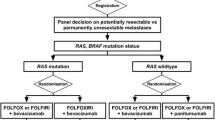Abstract.
Multimodal therapeutic concepts for the treatment of liver metastasis are currently undergoing evaluation – prompted by the fact that few patients have lasting benefit from resection alone. Thus, for example, in practice, virtually only metastases from colorectal carcinoma or neuroendocrine tumors can be referred to surgical treatment, and, of these, only 20–25 % are technically resectable. Furthermore, even after an R0 resection, recurrent disease subsequently develops in 60–75 % of the cases. In primarily non-resectable colorectal liver metastases, prior systemic treatment with 5-FU/folinic acid and oxaliplatin can result in partial or complete remission in 50–60 % of cases and, depending on patient selection criteria, a secondary R0 resection rendered possible in 14–38 %. Theoretical oncological considerations suggest that neoadjuvant treatment should be applied in the case of resectable liver metastases too. The question of whether the prognosis is then improved compared with resection alone is currently being investigated in a prospective multicentre study conducted by the EORTC. The value of adjuvant therapy administered with the aim of lowering the risk of recurrence following “curative” resection of liver metastases is presently not considered to have been adequately demonstrated. With regard to the efficacy of regional chemotherapy, the results of two prospective randomized studies are contradictory. Nor can the multimodal approach decisively improve the outcome of non-radical resection of metastatic lesions. This means that primary or secondary resection with a margin of clearance continues to represent the gold standard for the treatment of colorectal liver metastases. Neoadjuvant or adjuvant chemotherapy – where applicable with the additional use of various methods of thermal ablation (cryotherapy, laser therapy, high-frequency thermotherapy) – should be restricted to clinical trials.
Zusammenfassung.
In der Behandlung von Lebermetastasen werden gegenwärtig multimodale Therapiekonzepte evaluiert, da von einer alleinigen Resektion nur wenige Patienten dauerhaft profitieren. In einem chirurgischen Krankengut werden vorwiegend Patienten colorectaler Carcinome oder neuroendokriner Tumore zur Metastasenresektion vorgestellt, wobei hier etwa 20–25 % technisch resektabel sind. Nach einer R0-Ressektion colorectaler Lebermetastasen entwickeln 60–75 % ein Tumorrezidiv. Durch eine systemische Vorbehandlung mit 5-FU/Folinsäure und Oxaliplatin kann bei primär nicht-resektablen colorectalen Lebermetastasen in 50–60 % eine partielle oder komplette Remission erzielt und, abhängig von der Patientenselektion, in 14–38 % eine sekundäre RO-Resektion ermöglicht werden. Onkologische Überlegungen sprechen theoretisch dafür, auch bei resektablen Lebermetastasen eine neoadjuvante Therapie durchzuführen. Eine mögliche Prognoseverbesserung gegenüber der alleinigen Metastasenresektion ist aber nicht belegt und wird derzeit in einer prospektiven, multizentrischen Studie der EORTC überprüft. Der Stellenwert einer adjuvanten systemischen Chemotherapie, die auf die Senkung des Rezidivrisikos nach potentiell kurativer Lebermetastasenresektion abzielt, gilt derzeit als nicht hinreichend gesichert. Bezüglich der Wirksamkeit einer adjuvanten, regionalen Chemotherapie sind die Ergebnisse zweier prospektiver, randomisierter Studien widersprüchlich. Bei nicht-radikaler Metastasenresektion kann durch multimodale Therapie die Prognose ebenfalls nicht entscheidend verbessert werden. Die primäre oder sekundäre Resektion im Gesunden stellt somit nach wie vor den Gold-Standard in der Therapie colorectaler Lebermetastasen dar. Eine neoadjuvante oder adjuvante Chemotherapie, ggf. mit zusätzlicher Anwendung verschiedener thermischer Ablationsverfahren (Kryo-, Laser-, Hochfrequenzthermotherapie) sollte möglichst im Rahmen klinischer Studien erfolgen.
Similar content being viewed by others
Author information
Authors and Affiliations
Rights and permissions
About this article
Cite this article
Ott, R., Wein, A. & Hohenberger, W. Lebermetastasen – primäre oder multimodale Therapie?. Chirurg 72, 887–897 (2001). https://doi.org/10.1007/s001040170084
Issue Date:
DOI: https://doi.org/10.1007/s001040170084




